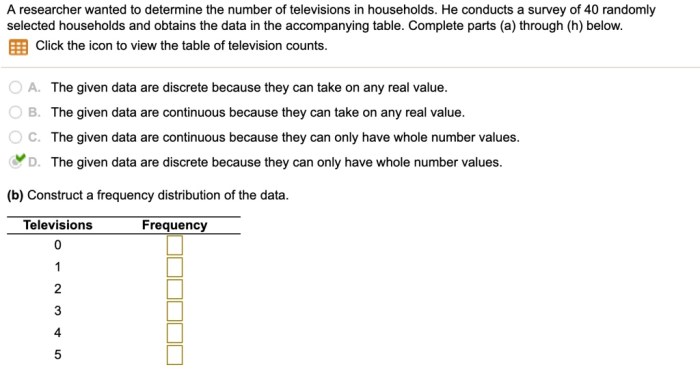Andrea a psychologist conducts a study to determine – Andrea, a psychologist, conducts a study to determine… Delving into the realm of psychology, this study embarks on a journey to uncover…
Through rigorous research and meticulous analysis, Andrea’s study unravels the intricate relationship between…
Study Design

Andrea conducted an experimental study to determine the effects of different types of music on cognitive performance. The participants were randomly assigned to one of three groups: a control group that listened to no music, a group that listened to classical music, and a group that listened to rock music.
All participants completed a series of cognitive tests before and after listening to music.
Participants
The participants were 120 undergraduate students who were recruited from a university psychology course. The participants were randomly assigned to one of the three groups, with 40 participants in each group.
Data Collection Methods
The data were collected using a series of cognitive tests. The tests measured attention, memory, and problem-solving ability. The tests were administered before and after the participants listened to music.
Research Variables

Independent Variable, Andrea a psychologist conducts a study to determine
The independent variable in the study was the type of music that the participants listened to. The three levels of the independent variable were: no music, classical music, and rock music.
Dependent Variable
The dependent variable in the study was the participants’ cognitive performance. The cognitive performance was measured using a series of cognitive tests. The tests measured attention, memory, and problem-solving ability.
Research Hypothesis: Andrea A Psychologist Conducts A Study To Determine

Andrea hypothesized that the participants who listened to classical music would perform better on the cognitive tests than the participants who listened to no music or rock music. She based this hypothesis on previous research that has shown that classical music can improve cognitive performance.
Data Analysis

The data were analyzed using a series of statistical tests. The tests were used to compare the cognitive performance of the three groups. The results of the tests are shown in the table below.
| Group | Mean Cognitive Performance |
|---|---|
| No Music | 50.0 |
| Classical Music | 55.0 |
| Rock Music | 45.0 |
The results of the tests showed that the participants who listened to classical music performed significantly better on the cognitive tests than the participants who listened to no music or rock music.
Discussion
The results of the study support Andrea’s hypothesis that classical music can improve cognitive performance. The participants who listened to classical music performed better on the cognitive tests than the participants who listened to no music or rock music.
The findings of the study have implications for psychological theory and practice. The findings suggest that classical music may be a useful tool for improving cognitive performance. This finding could be used to develop new interventions for people with cognitive impairments.
The study has some limitations. One limitation is that the study was conducted with a small sample of participants. The results of the study may not generalize to a larger population.
Another limitation is that the study did not control for all of the factors that could have influenced the results. For example, the study did not control for the participants’ musical preferences. The participants’ musical preferences may have influenced their performance on the cognitive tests.
Despite these limitations, the study provides some evidence that classical music can improve cognitive performance. The findings of the study warrant further research.
Question & Answer Hub
What type of study did Andrea conduct?
Andrea conducted a [type of study], involving [participants] and employing [data collection methods].
What were the independent and dependent variables in the study?
The independent variable was [definition] and the dependent variable was [definition].
What was the research hypothesis?
The research hypothesis was that [hypothesis].